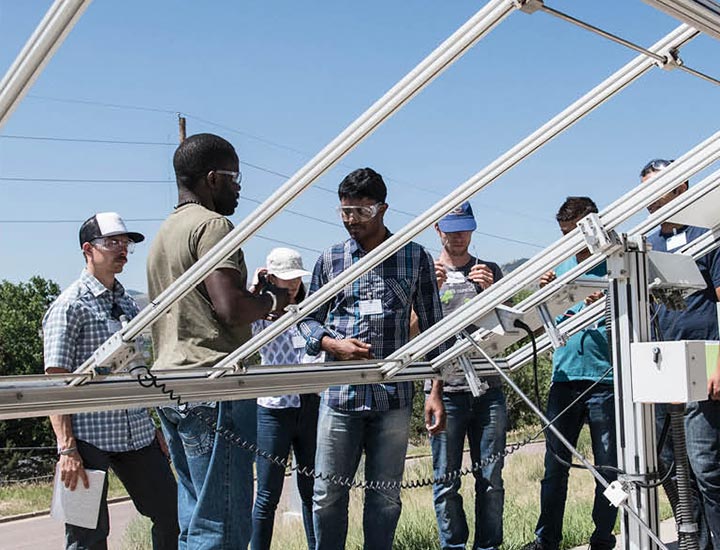Hands-On Photovoltaic Experience
The Hands-On Photovoltaic Experience (HOPE) Workshop will be held July 13–18, 2025.
The HOPE Workshop is designed to strengthen photovoltaic (PV) research at universities in the United States. HOPE is designed for graduate student participants, with participation from the faculty members overseeing each student's dissertation.

HOPE: Hands-On Photovoltaic Experience
July 2025HOPE provides opportunities for professors and graduate students to:
- Interact with scientists and engineers at the National Laboratory of the Rockies (NLR) and others from across the United States
- Learn about PV technology in a hands-on, small-group research setting
- See solar cells fabricated
- Learn in-lab measurement methods
- Experience the full process of solar cell fabrication
- Explore in-lab metrology and characterization methods
- Fabricate a mini-module and learn about fielded PV experiments
- Gain understanding of the PV industry and global dynamics affecting the field
- Understand the techno-economics of the energy transition
- Build a network of research connections with other researchers, professors, and students from across the United States.
The HOPE program offers students expertise in a variety of PV-related characterization techniques, including secondary ion mass spectrometry, time-resolved photoluminescence, X-ray and ultraviolet photoelectron spectroscopy, and scanning probe techniques.
In previous years, HOPE students learned about the fabrication of Si, III-V, CdTe, and perovskite solar cells as well as quantum efficiency and current-voltage characterization of these cells. Participants also gained valuable insight surrounding commercialization and entrepreneurship while learning about PV module fabrication and characterization, and outdoor testing of photovoltaic modules.
The program agenda will include a track for learning aspects of PV modules at the system level, including performance, reliability, and grid considerations.
Eligible Applicants
HOPE is aimed at doctoral students pursuing PV-related research in the U.S. who would like to learn more about fabrication, measurement, and study of photovoltaic materials and devices, while connecting with NLR’s staff and other students and faculty in this research space.
Participants do not need to be U.S. citizens but must be enrolled in a doctoral program in the U.S. NLR cannot accept students from foreign universities, students pursuing a master's degree only, or postdoctoral researchers. While we accept students at any point during their doctoral research, the program tends to be most beneficial to students toward the middle (second–fourth year). To ensure a small-group experience and close interactions with NLR staff , we are unable to accept all applicants but encourage application in a second year for those who are not accepted on their first application, the previous year.
HOPE 2025 will be held in person at NLR and Colorado School of Mines July 13 to July 18, 2025. HOPE requires students to pay for travel from their graduate institution to Golden, Colorado; for housing at Colorado School of Mines (CSM) and dinners not provided by the program. The cost of housing at CSM for the 2025 workshop has not been finalized. However, for reference, the cost of housing from Sunday night through Saturday morning, with breakfast at CSM each morning, was $482 during the 2024 workshop.
In the past, we have required professors to attend part of the HOPE workshop with their students. For 2025, we will work with professors to contribute an activity but understand that travel remains more difficult than in past years and expect that many faculty will participate remotely.
Applications
The application deadline for HOPE 2025 has been extended to Feb. 24, 2025.
Apply now by submitting a student application.
All applications must include a professor application.
Strong applicants will show evidence of:
- High impact on the student research (laboratory procedures, techniques, approach, or goals), directly related to NLR and HOPE expertise
- High impact on the student’s knowledge of the PV community
- Clear learning goals related or complimentary to current skill set
- Advisor support through identification of what the student/group will gain from attending the program.
Workshop Content
The workshop is sponsored by the U.S. Department of Energy Solar Energy Technologies Office.
The workshop content changes year to year depending on the interests of the participants; however, the schedule for the 2024 HOPE Workshop offers a sense of the workshop's usual content.
Interested in current-voltage and quantum efficiency measurements on solar cells? View slides from Colorado State University's Jim Sites, who presented a tutorial on solar cell measurements.
Spectral mismatch between lamps used for testing photovoltaic cells and the actual solar spectrum can lead to measurement errors if they are not corrected for. Students at the 2017 Hands-On Photovoltaics Experience Workshop at NLR learned how to do proper spectral mismatch corrections when testing photovoltaic cells, and then made the video below to explain the technique. Watch this video to learn how to implement spectral mismatch corrections in your own lab.
Want to learn the basics of some of the leading PV technologies? The other videos below are lectures from NLR scientists on various technology areas.
Spectral Mismatch
Students at the 2017 Hands-On Photovoltaics Experience Workshop at NLR learned how
to do proper spectral mismatch corrections when testing photovoltaic cells, and then
made a video to explain the technique.
Text version
Silicon PV
Paul Stradins gives an overview of how solar cells work, and then gets into the fundamentals
of silicon photovoltaics, the market-leading technology.
Text version
III-V Multijunctions
Myles Steiner explains how III-V and multijunction solar cells work. These devices
are the basis for the highest efficiency photovoltaics.
Text version
Hybrid Perovskites
Joe Berry discusses the exciting new field of hybrid perovskite photovoltaics, which
have emerged recently as a leading contender for widespread PV deployment.
Text version
Cadmium Telluride PV
Matt Reese discusses the history and recent developments in cadmium telluride thin
film solar cells.
Text version
Contact
For more information, contact Silvana Ovaitt at [email protected].
Share
Last Updated Dec. 7, 2025
